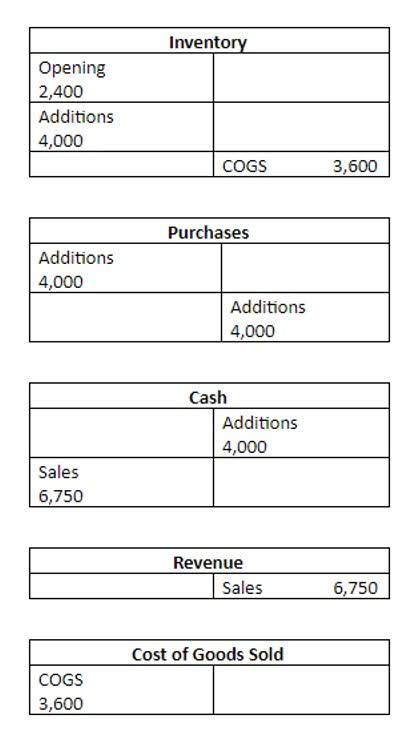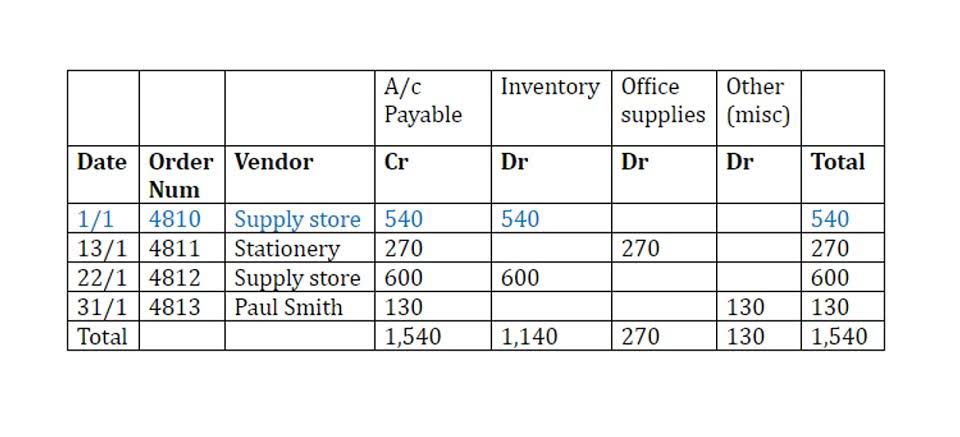As employees leave the organization, new employees must be trained in the accounting process. It is essential to ensure that the training provided to new employees is consistent and comprehensive. Failure to provide consistent training could lead to inconsistencies in accounting practices and could potentially lead to errors in financial reporting. The full disclosure principle states that you should include in an entity’s financial statements all information that would affect a reader’s understanding of those statements, such as changes in accounting principles applied. The interpretation of this principle is highly judgmental, since the amount of information that can be provided is potentially massive.
Examples of Consistency in Accounting Methods
This method often shows a lower net income which can be beneficial to minimize taxes. When they sell, 40 units, they will record 30 sales at $10 and 10 sales at $15, leaving a cost of inventory of 40 units at $15. A company’s accounting results are verifiable when they’re reproducible, so that, given the same data and assumptions, an independent accountant would come up with the same result the company did. Verifiably is the cumulative effect of using historical cost, objectivity, and the monetary unit principle. The consistency principle of accounting states that once an entity has adopted a certain practice and method, it should use the same practice and method for subsequent events of the same nature unless there is a sound reason to switch. For example, if the performance is based on Net Sales, management might not recognize revenues by using the same accounting policies.
Consistency Principle of Accounting
The purpose of financial statements is to provide information about an entity’s financial position and performance to its users, such as investors, creditors, and regulators. The consistency principle is particularly important when it comes to the application of accounting standards. Entities must ensure that they apply accounting standards consistently and in a manner that accurately reflects the economic substance of transactions and events. An example of the Consistency Principle is a company consistently using the straight-line depreciation method for their assets. If they decide to switch to a different method, say the declining balance method, they are expected to continue using this new method consistently in the future accounting periods.
Why is the accounting principle inconsistent?
It also provides the stakeholders and shareholders with a sense of satisfaction that the performance of the business can be tracked using a tried and tested accounting methodology which gives consistent results. For example, segregation of duties ensures that no single individual has complete control over a financial transaction from initiation to recording. This control measure reduces the risk of fraudulent activities and promotes consistency in financial reporting. When doing your accounting, there are a number of different methods or principles that accountants can use.
The GAAP has gradually evolved, based on established concepts and standards, as well as on best practices that have come to be commonly accepted across different industries. In the realm of scaling businesses, the validation of costs stands as a pivotal process that… In some cases, organizations will change how they report information in order to take advantage of loopholes or manipulate how data looks.
From the perspective of businesses, the consistency principle provides several benefits. Firstly, it promotes clarity and reduces confusion by establishing a standard framework for recording and reporting financial transactions. By following consistent practices, companies can streamline their accounting processes and minimize errors or discrepancies that may arise from constantly changing methods. Moreover, maintaining uniformity enables organizations to track their financial performance accurately over time, facilitating meaningful comparisons between different periods.
The main objective behind this principle is to ensure that performance can be measured and judged on the same basis year after year. For example, if a business uses the straight-line method for Depreciation on its motor vehicles in 2015 but changes it to the declining balance method for next year, accounts of these two years will not be comparable. Let’s assume that a U.S. corporation uses the FIFO cost flow assumption for valuing its inventory and determining its cost of goods sold. Due to the increasing cost of its materials, it concludes that LIFO will better indicate the company’s true profit. In the year of the change from FIFO to LIFO (and in years when comparisons are presented), the company must disclose the break in consistency. In this case, the entity should apply with IAS 8 whether it is a retrospective or prospective change.
It ensures that financial data can be confidently compared over successive periods, thus providing a clear picture of the financial health and trajectory of a business over time. It enables auditors to perform comparative analysis on the financial performance of the business by taking into account data obtained from different accounting periods. Accounting consistency applies to the quality of accounting information because it allows end users to understand and compare financial https://www.bookkeeping-reviews.com/ statements. If a company changed accounting treatment for its accounts receivable every single year, it would be difficult to compare the prior years’ accounts receivable balances with the current year. Since each year follows a different rule or standard, each year wouldn’t be able to be compared. Relying on a consistent accounting method ensures that statements and information will be comparable, and it will be easier to see trends and extract accurate information.
Consistency in accounting principles is helpful in performing comparative study of the financial performance of the business. It makes the management familiar with the accounting principles and practices and therefore is in a better position to make business decisions. With Debitoor invoicing software, you have the option to use cash or accrual accounting methods for your business, which can be set under account settings. By choosing to follow a cash accounting method your reports will be based on payment dates, which will be reflected in your invoices and other documents you wish to export.
- The competition’s commissions such as SEC can also interpret such moves as artificial profit manipulation and result in penalties.
- When financial statements are consistent over time, users can more easily identify trends, changes, and anomalies in an entity’s financial position and performance.
- If the accounting policies and methodologies employed by a company in preparing the financial statements were to change every period, this would significantly increase the cost of training and reduce the efficiency of the employee.
- Only when a principle or method has a new version that improves reported financial results should you change.
- The Consistency Principle refers to a financial accounting standard stating that a business should use the same accounting methods and procedures from period to period.
The Consistency Principle in finance refers to the practice of applying the same accounting methods over different periods of time to ensure accurate comparison of financial data. This principle is important to avoid any deliberate distortions in financial reporting and analysis. It helps investors and stakeholders compare financial statements from different periods fairly and accurately. Regulatory frameworks and standards provide a solid foundation for the consistency principle in accounting practices. These guidelines ensure that financial statements are prepared consistently over time, allowing for meaningful comparisons and reliable decision-making. By adhering to these frameworks, companies can enhance transparency, build trust among stakeholders, and contribute to the overall integrity of financial reporting.
The company can calculate its inventory in two ways with the LIFO or the FIFO methods. Let us understand how the consistency principle helps in maintaining accurate records with an example. To get a look at the Consistency Principle, let’s take a look at two main methods of reporting account inventory and the cost of goods sold.
Consistency in financial reporting is a fundamental principle that ensures uniformity and comparability in accounting practices. It involves applying the same accounting methods and principles consistently over time, allowing for accurate analysis and evaluation of financial information. By maintaining consistency, businesses can provide reliable and meaningful financial statements that aid decision-making processes for various stakeholders, including investors, creditors, and regulators. Consistency is a fundamental principle in accounting that ensures uniformity and comparability of financial information over time. It is crucial for businesses to adhere to consistent accounting practices to provide accurate and reliable financial statements. By maintaining consistency, companies can enhance transparency, facilitate decision-making processes, and build trust among stakeholders.
In the years in which Horizon Real Estate does not need a tax deduction, it capitalizes these licenses and amortizes them. The consistency principle states that once a company adopts a certain accounting policy or method, it must be applied consistently in the future as well. This means that similar events and transactions over time will have the same accounting treatment. US securities law requires all publicly-traded companies, as well as any company that publicly releases financial statements, to follow the GAAP principles and procedures. The consistency principle is one of the guidelines and standards which businesses are required to follow according to the accounting principles listed under UK GAAP.
This principle plays a crucial role in maintaining transparency, accuracy, and reliability in financial statements, allowing stakeholders to make informed decisions based on consistent information. The consistency principle is a critical accounting convention that promotes uniformity and comparability in financial reporting. It ensures that companies apply the same accounting policies and methods consistently over time, enabling stakeholders to make informed decisions about the business.
Understanding accounting conventions is crucial for anyone who wants to work in accounting or finance. By following these conventions, businesses can ensure that their financial statements are accurate, reliable, and consistent over time. These conventions are a set of standards and guidelines that dictate how financial information should be recorded and reported. They are designed to ensure consistency and accuracy across different businesses and industries.
This type of back and forth causes the financial statements to be incomparable and useless for trend analysis. As an example of a clearly immaterial item, you may have prepaid $100 of rent on a post office box that covers the next six months; under the matching principle, you should charge the rent to expense over six months. However, the amount of the expense is so small that no reader of the financial statements will be misled if you charge the entire $100 to expense in the current period, rather than spreading it over the usage period. In fact, if the financial statements are rounded to the nearest thousand or million dollars, this transaction would not alter the financial statements at all. Accounting standards do not say that business should adhere to the principle of consistency in every case.
But, the company subsequently wants to change its accounting policies from a straight line to a declining balance. The articles and research support materials available on this site are educational and are not intended to be investment or tax advice. top ideas for recruiting great job candidates All such information is provided solely for convenience purposes only and all users thereof should be guided accordingly. GAAP is the set of standards and practices that are followed in the United States, but what about other countries?
Finance Strategists is a leading financial education organization that connects people with financial professionals, priding itself on providing accurate and reliable financial information to millions of readers each year. For information pertaining to the registration status of 11 Financial, please contact the state securities regulators for those states in which 11 Financial maintains a registration filing. For example, most oil marketing companies use the same methods of capitalization, income recognition, or treatment of research expenditure. The ruling about consistency applies where a change in approach could affect the profit of a business.
Changes can be made to improve work of accounting, but an appropriate note must be given which explains about change made. However, in this example, whatever method is chosen for the purpose of depreciation must be consistently used for the same class of assets year after year. – Ed’s Lakeshore Real Estate buys software licenses for its property listing programs every year. Ed’s capitalizes these licenses and amortizes them in the years he doesn’t need a deduction and he expenses them in the years that he needs a tax deduction. This violates the consistency principle because Ed uses different accounting treatments for the same or similar transactions over time. In addition, or as an alternative, are the International Financial Reporting Standards (IFRS) established by the International Accounting Standards Board (IASB).
In other words, companies shouldn’t bounce between accounting rules and treatments to manipulate profits or other financial statement elements. Many times, a lender or investor will want a client’s financial statements to be audited, showing the internal controls as well as whether generally accepted accounting principles (GAAP) have been used. One aspect auditors look for is the Consistency Principle in order to compare results from period to period. If you aren’t familiar with this principle and why it is important, in this article our CPAs break it down, explain the advantages of using it, give reasons for its importance, and provide some examples. The consistency principle states that, once you adopt an accounting principle or method, continue to follow it consistently in future accounting periods. Only change an accounting principle or method if the new version in some way improves reported financial results.
Moreover, the consistency principle helps entities to identify errors and omissions in financial statements, enabling them to correct any inaccuracies before the financial statements are released to users. In addition, this concept, the consistency principle, is also quite important for users of financial statements, investors, and shareholders. And sometimes, management could use the inconstancy principle on the same accounting transactions or accounting even in their financial records. It is a huge risk to the user of financial statements if they are not fairly present. The main objective of the consistency principle is to avoid any intention from management to use an inconsistent approach to manipulate the financial information to ensure their financial statements look healthy. Consistency principle would ensure that employees are using the same accounting methodologies period to period and therefore they do not have to be retrained.…






